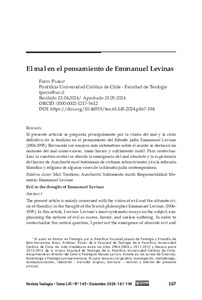Por favor, use este identificador para citar o enlazar este ítem:
https://repositorio.uca.edu.ar/handle/123456789/19837| Título: | El mal en el pensamiento de Emmanuel Levinas | Otros títulos: | Evil in the thought of Emmanuel Levinas | Autor: | Parra, Fredy | Palabras clave: | Auschwitz; SUFRIMIENTO; RESPONSABILIDAD; MEMORIAS | Fecha de publicación: | 2024 | Editorial: | Pontificia Universidad Católica Argentina. Facultad de Teología | Resumen: | El presente artículo se pregunta principalmente por la visión del mal y la crisis definitiva de la teodicea en el pensamiento del filósofo judío Emmanuel Levinas (1906-1995). Revisando sus ensayos más sistemáticos sobre el asunto se destacan las nociones del mal como exceso, como horror y sufrimiento inútil. Para contextua lizar la cuestión central se aborda la emergencia del mal absoluto y la experiencia del horror de Auschwitz en el testimonio de víctimas sobrevivientes y en la reflexión filosófica y religiosa de algunas voces de la filosofía judía contemporánea. The present article is mainly concerned with the vision of evil and the ultimate cri sis of theodicy in the thought of the Jewish philosopher Emmanuel Levinas (1906- 1995). In this article, I review Levinas’s most systematic essays on the subject, em phasizing the notions of evil as excess, horror, and useless suffering. In order to contextualize the central question, I point out the emergence of absolute evil and the experience of the horror of Auschwitz in the testimony of surviving victims and the philosophical and religious reflection of some voices of contemporary Jew ish philosophy. |
URI: | https://repositorio.uca.edu.ar/handle/123456789/19837 | ISSN: | 2683-7307 (online) 0328-1396 (impreso) |
Disciplina: | TEOLOGIA | DOI: | 10.46553/teo.61.145.2024.p167-194 | Derechos: | Atribución-NoComercial-CompartirIgual 4.0 Internacional | Fuente: | Teología. Tomo 61, No. 145, 2024 |
| Aparece en las colecciones: | TEO - 2024 Tomo LXI nro. 145 |
Ficheros en este ítem:
| Fichero | Descripción | Tamaño | Formato | |
|---|---|---|---|---|
| mal-pensamiento-emmanuel.pdf | 450,04 kB | Adobe PDF |  Visualizar/Abrir |
Este ítem está sujeto a una Licencia Creative Commons

